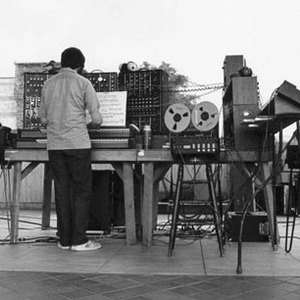
| Trackimage | Playbut | Trackname | Playbut | Trackname |
|---|---|---|---|---|
| 81464295 | Play | Ceres Motion | 00:00 Tools | |
| 81464293 | Play | Downtown | 00:00 Tools | |
| 81464294 | Play | Theme from After the Fall | 00:00 Tools | |
| 81464296 | Play | Oleo Strut | 00:00 Tools | |
| 81464297 | Play | WaterWheel | 00:00 Tools | |
| 81464298 | Play | All Set | 00:00 Tools | |
| 81464300 | Play | C-A-G-E Part II | 00:00 Tools | |
| 81464301 | Play | Harpsichord Truck | 00:00 Tools | |
| 81464299 | Play | Ceres Motion (1973) | 00:00 Tools | |
| 81464302 | Play | Train (1970) | 00:00 Tools | |
| 81464303 | Play | Music (1972) | 00:00 Tools | |
| 81464305 | Play | Easter (1970) | 00:00 Tools | |
| 81464304 | Play | Cloudscape For Peggy (1970) | 00:00 Tools | |
| 81464306 | Play | Cloudscape For Peggy | 00:00 Tools | |
| 81464308 | Play | Easter | 00:00 Tools | |
| 81464307 | Play | The Continuing Story of Counterpoint: Part One (Borden) | 00:00 Tools | |
| 81464309 | Play | Train | 00:00 Tools | |
| 81464311 | Play | Music | 00:00 Tools | |
| 81464310 | Play | The Continuing Story of Counterpoint: Part Three (Borden) | 00:00 Tools | |
| 81464312 | Play | C-A-G-E, Part III (Borden) | 00:00 Tools | |
| 81464313 | Play | Steve Drews - Oleo Strut | 00:00 Tools | |
| 81464314 | Play | David Borden - All Set | 00:00 Tools | |
| 81464315 | Play | The Continuing Story Of Counterpoint - Part One (1976) | 00:00 Tools | |
| 81464316 | Play | C-A-G-E [part 2] | 00:00 Tools | |
| 81464317 | Play | C-A-G-E, Part 3 (1975) | 00:00 Tools | |
| 81464318 | Play | Steve Drews - Waterwheel | 00:00 Tools | |
| 81464321 | Play | Oleao Strut | 00:00 Tools | |
| 81464319 | Play | David Borden - C-A-G-E Part II | 00:00 Tools | |
| 81464320 | Play | The Continuing Story Of Counterpoint - Part Three (1976) | 00:00 Tools | |
| 81464322 | Play | Steve Drews - Downtown | 00:00 Tools | |
| 81464323 | Play | Steve Drews - Harpsichord Truck | 00:00 Tools | |
| 81464325 | Play | C-A-G-E | 00:00 Tools | |
| 81464324 | Play | C-A-G-E, Pt. 2 | 00:00 Tools | |
| 81464326 | Play | C-A-G-E, Part II | 00:00 Tools | |
| 81464327 | Play | Ceres Motion [1973] | 00:00 Tools | |
| 88538844 | Play | The Continuing Story of Counterpoint: Part One | 00:00 Tools | |
| 81464328 | Play | Music [1972] | 00:00 Tools | |
| 88538843 | Play | C-A-G-E, Part III | 00:00 Tools | |
| 81464329 | Play | Ceres Motion (excerpt) | 00:00 Tools | |
| 81464330 | Play | Double Portrait | 00:00 Tools | |
| 81464331 | Play | Dialogue V | 00:00 Tools | |
| 81464332 | Play | Dialogue VII | 00:00 Tools | |
| 81464333 | Play | Theme from After the Fall (1976) | 00:00 Tools | |
| 88538845 | Play | Oleo Strut (SNS cut) | 00:00 Tools | |
| 81464334 | Play | Cloudscape for Peggy [1970] | 00:00 Tools | |
| 81464335 | Play | Dialogue XV | 00:00 Tools | |
| 81464336 | Play | K216.01a | 00:00 Tools | |
| 81464337 | Play | K216.01b | 00:00 Tools | |
| 81464338 | Play | Dialogue IV | 00:00 Tools | |
| 81464339 | Play | Dialogue I | 00:00 Tools |

-
- 19,951
- plays
-
- 2,764
- listners
-
- 19951
- top track count
Mother Mallard's Portable Masterpiece Company, formed in 1969 by David Borden, was the world's first synthesizer ensemble, predating groups like Tonto's Expanding Head Band and Tangerine Dream. David Borden was in close contact with Dr. Robert Moog and was one of the first musicians to use his Minimoog. After recruiting Steve Drews and Linda Fisher to operate additional synthesizers, the group began playing concerts of minimalist music by Terry Riley, Steve Reich, and Philip Glass. They began recording their first self-titled album in 1970, but it would not be released until 1973 by Earthquack Records. Their second album, Like a Duck to Water, was released in 1976. David Borden and Mother Mallard continued performing and releasing albums in the following years, most notably on the Cuneiform record label. Borden adopted new digital synthesizer technology over time, and also incorporated various acoustic woodwind instruments and voices. Borden's most ambitious work, The Continuing Story of Counterpoint Parts 1-12, composed between 1976-1987, was recorded and released on three Cuneiform CDs between 1988-1991. The label also reissued Mother Mallard's first two 1970s recordings on CD. Read more on Last.fm. User-contributed text is available under the Creative Commons By-SA License; additional terms may apply.